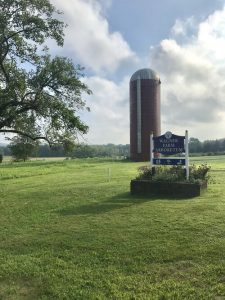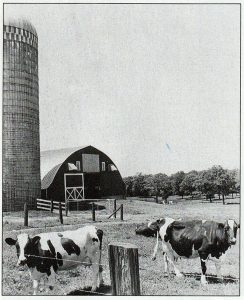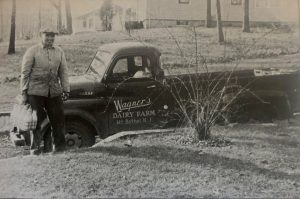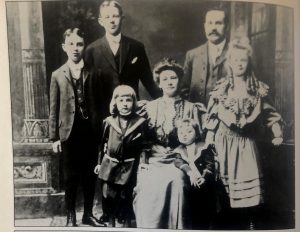
History
For as long as residents of Warren Township can remember, Wagner’s Farm on Mountain Avenue has been a big open green space, on both sides of the road. Many of us fondly remember when it was a working farm, complete with farm store and fresh milk.
Some years ago, when the Wagner’s retired, most of the farm was purchased with Green Acres funding, preserving it as open space forever. But one portion (10 acres) was purchased directly by Warren Township for “open space, conservation, active and passive public recreation and environmental protection.” As a result, the vast majority of Warren residents saw (and see) these 10 acres as part of the preserved green space.
So it was a shock to the whole town when the Township Committee decided to allow development of the property as part of the Township’s Affordable Housing agreement. In subsequent Planning Board hearings, residents raised numerous concerns about the site and the specific development (see the “Proposed Development”). Despite these issues, the Planning Board approved the development.
At this point, those of us concerned about the future of Warren Township are supporting legal challenges to development of this property in order to keep Wagner’s Farm Green. These challenges require funding so please take a moment and donate what you can to our GoFundMe.
A brief history of Wagner Farm
2022
- Legal challenges filed to the proposed development.
2021
- Bergen County United Way and Madeline Partners, LLC propose housing complex for Wagner Farm called “Cawley Crossing.”
- Residents mobilize to oppose the development.
- Four Warren Township Planning Board hearings result in approval of project despite numerous concerns from residents.
2018
- A portion of Wagner Farm included in Warren Township Affordable Housing Agreement.
2009
- Warren Arboretum Children’s Garden opens.
2007
- Warren Arboretum Giving Garden Project started to provide vegetables for the poor and needy.
- To date, nearly 500,000 pounds of food have been distributed
2004

2001
- Township Committee authorizes $4.5 million to purchase Wagner Farm for open space.
- Wagner Farm purchased by Warren Township from the Wagner’s.
2000
- Haskell Developers propose 230 unit continuing care facility on Wagner’s Farm.
1987
- Wagner Dairy Store closes.
1975
- Wagner Dairy Store opens. “Need Photo”
- “The store attracted customers from miles around for Wagner’s fresh milk and cream and their delicious chocolate milk.”

1953
- There were 12 working dairy farms in the township, and Wagner’s was one of the largest. Wagner’s grandson, Charles (in photo below), delivered milk and cream to more than a thousand families in Warren, Watchung and nearby communities.
- Wagner’s had 120 Holstein cows.

1917
- Louis Wagner, a butcher from New York City, buys the 100 acre farm “west of Sheriff Cooper.”
- It was a small operation at first, with chickens, horses, pigs, 12 cows and some fruit trees, “just enough to get by on.”

1867 Jacob Kirkpatrick, in his biography
- “On the south lies Stony Hill, and on the north extending half a mile to the banks of the Passaic is a slope of green and fertile meadow, while in the distance in full view is the continuous range of high land in Morris County known as Long Hill, covered with well-tilled farms and dotted with comfortable farmhouses.”
1736
- Initial settlement by Andrew Kirkpatrick from Belfast, Ireland
Historical photos and information from “Images of America: Warren Township” and “Warren A to Z: An Entertaining Guidebook to the 275 Year History of Warren Township, New Jersey,” both by Alan A. Siegel. Published 1996 and 2006, respectively. The following is a quote from Warren A to Z.
Wagner Farm
Louis Wagner, a butcher from New York City, bought the 100 acre farm West of Sheriff Edward Cooper in 1917. Wagner was a small operation at first, with chickens, horses, pigs, 12 cows and some fruit trees, “just enough to get by on,” remembered his granddaughter. By the 1950s there were 12 working dairy farms in the township, and Wagner’s was one of the largest. Wagner’s grandson, Charles, delivered milk and cream to more than a thousand families in Warren, Watchung and nearby communities. His brothers, Richard and Louis (who served on the township committee) also worked the farm. One hundred twenty Holstein cows contentedly chewed their way from one pasture to another, often crossing Mountain Avenue (there was no traffic then). In 1975 the family gave up its milk routes and opened the Wagner Dairy Farm store on Mountain Avenue. A few steps west of the silo, the store attracted customers from miles around for Wagner’s fresh milk and cream and their delicious chocolate milk. When the store closed in 1986, it marked the end of an era.
The Wagner and adjacent Cooper farms were perhaps the oldest working farms in Warren township. The land was originally owned by Andrew Kirkpatrick, who came to New Jersey in 1736 from Belfast Ireland. Years later his grandson recalled that the family landed in Delaware, crossed “to Philadelphia and wandered up through the state of New Jersey (which was partially settled) till they reached Bound Brook, and from that they went over the mountain. They were all on foot—there was no road other than the Indian path. In the path before them they saw a land tortoise, speckled, sticking up its head; and as they had heard of rattlesnakes, they thought that monster must be one so they turned out in the woods and went around leaving his ‘torkleship’ in full position of the path.” Andrew’s grandson Alexander married Sally Carl, the daughter of John Carl of Long Hill, a wealthy landowner justice of the peace and member of the colonial privy council. Alexander Kirkpatrick was also a judge, a private in the Somerset county militia during the revolutionary war and undevoted member of the basking ridge Presbyterian Church. According to one history he was habitually so early hitching up his wagon for Sunday church services that neighbors time their rising by his passage. His son Jacob became a prominent clergyman. Jacob’s biographer, writing an 1867, described the family home in words still true today: “On the south lies Stony Hill, and on the north extending half a mile to the banks of the Passaic is a slope of green and fertile meadow, while in the distance in full view is the continuous range of high land in Morris County known as Long Hill, covered with well-tilled farms and dotted with comfortable farmhouses.”
Wagner Farm Arboretum
News that Haskell Developers had taken an option on the 90-acre Wagner Farm to build a continuing care community for the elderly broke in the fall of 2000, raising a storm of public protest. Haskell’s proposal for some 230 living units, a nursing home, healthcare center and parking garage encompassed both sides of Mountain Avenue. Responding to public outrage that Warren’s last remaining farm was to be bulldozed, the Township Committee acted swiftly, voting unanimously in January 2001 to spend $4.5 million dollars to acquire the site for open space. The Wagner Farm Arboretum Foundation, formed to support the development of the arboretum, has proposed formal gardens, a community garden, and walking paths connecting with the former Glenhurst Golf Course property to east. The large silo and other farm buildings are to be preserved
1917
Louis Wagner, a butcher from New York City, buys the 100 acre farm “west of Sheriff Cooper.”
1953
There were 12 working dairy farms in the township, and Wagner’s was one of the largest.
2000
Wagner Farm purchased by Warren Township from the Wagner’s.
2018
A portion of Wagner Farm included in Warren Township Affordable Housing Agreement.
2021
Bergen County United Way and Madeline Partners, LLC propose housing complex for Wagner Farm called “Cawley Crossing.”
2022
Legal challenges to proposed development.

